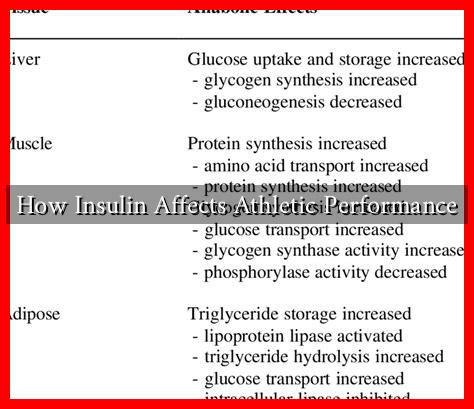-
Table of Contents
How Insulin Affects Athletic Performance
Insulin, a hormone produced by the pancreas, plays a crucial role in regulating blood sugar levels and energy metabolism. For athletes, understanding how insulin affects performance can be the key to optimizing training and competition outcomes. This article delves into the relationship between insulin and athletic performance, exploring its mechanisms, benefits, and potential drawbacks.
The Role of Insulin in Energy Metabolism
Insulin is primarily known for its role in glucose metabolism. When we consume carbohydrates, they are broken down into glucose, which enters the bloodstream. In response, the pancreas releases insulin to facilitate the uptake of glucose into cells, where it can be used for energy. This process is vital for athletes, as energy availability directly impacts performance.
Insulin Sensitivity and Athletic Performance
Insulin sensitivity refers to how effectively the body responds to insulin. Higher insulin sensitivity means that the body can utilize glucose more efficiently, which is beneficial for athletes. Here are some key points regarding insulin sensitivity and performance:
- Improved Energy Utilization: Athletes with high insulin sensitivity can better utilize carbohydrates during high-intensity workouts, leading to enhanced performance.
- Faster Recovery: Insulin helps in the replenishment of glycogen stores post-exercise, which is crucial for recovery and subsequent training sessions.
- Body Composition: Improved insulin sensitivity is associated with better body composition, allowing athletes to maintain lean muscle mass while reducing fat.
Insulin and Endurance Sports
In endurance sports, such as long-distance running or cycling, maintaining stable blood glucose levels is essential. Athletes often consume carbohydrates during prolonged exercise to prevent hypoglycemia. Insulin plays a role in this context as well:
- Glycogen Storage: Insulin promotes glycogen storage in muscles and the liver, which is critical for endurance athletes who rely on these stores during prolonged activity.
- Fat Utilization: While insulin promotes glucose uptake, it also inhibits fat breakdown. Athletes must balance carbohydrate intake to optimize both glucose and fat utilization during endurance events.
Insulin and Strength Training
For strength athletes, insulin’s anabolic properties are particularly beneficial. Insulin not only helps in glucose uptake but also plays a role in protein synthesis:
- Muscle Growth: Insulin promotes amino acid uptake into muscle cells, enhancing protein synthesis and muscle growth.
- Reduced Muscle Breakdown: Insulin has anti-catabolic effects, helping to preserve muscle mass during intense training.
Potential Drawbacks of Insulin Manipulation
While insulin can enhance athletic performance, improper management can lead to negative consequences:
- Hypoglycemia: Athletes who manipulate insulin levels without proper knowledge may experience dangerously low blood sugar levels, leading to fatigue, confusion, or even loss of consciousness.
- Insulin Resistance: Over time, excessive carbohydrate intake and poor dietary choices can lead to insulin resistance, negatively impacting performance and overall health.
Case Studies and Real-World Examples
Several studies have highlighted the importance of insulin in athletic performance. For instance, a study published in the Journal of Sports Medicine found that athletes with higher insulin sensitivity had better performance metrics in endurance events. Additionally, elite bodybuilders often monitor their carbohydrate intake and insulin levels to maximize muscle growth while minimizing fat gain.
Conclusion
Insulin plays a multifaceted role in athletic performance, influencing energy metabolism, recovery, and muscle growth. Understanding how to optimize insulin sensitivity through diet and training can provide athletes with a significant edge. However, it is crucial to approach insulin management with caution to avoid potential pitfalls such as hypoglycemia and insulin resistance. By balancing carbohydrate intake and maintaining a healthy lifestyle, athletes can harness the power of insulin to enhance their performance and achieve their goals.

